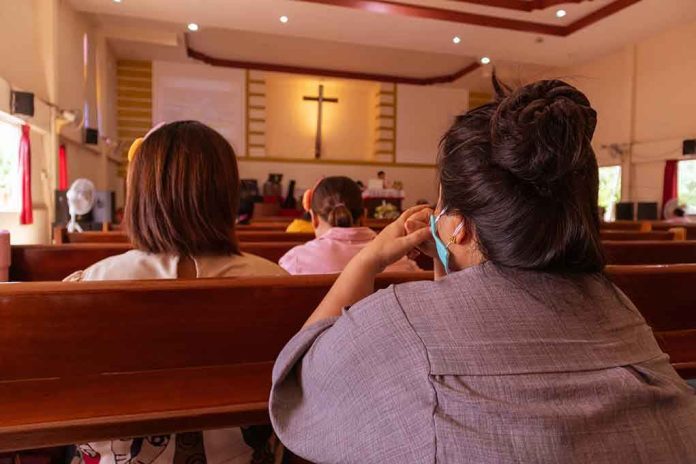
Federal authorities have unveiled a sweeping crackdown on immigration fraud, arresting a Florida pastor accused of transforming his church into a hub for orchestrating an organized scheme to defraud vulnerable immigrants—a case that highlights both the sophistication of modern fraud rings and the urgent demand for renewed law enforcement vigilance.
Story Highlights
- Florida pastor arrested for allegedly running an immigration fraud scheme through his church, exploiting trust in faith-based communities.
- Case prosecuted under Florida Statute 817.034, which targets systematic, ongoing fraud intended to deceive for financial gain.
- Authorities cite escalation in complex frauds as a key driver for recent legislative reforms and increased penalties.
- Legal experts and law enforcement stress importance of intent, planning, and victim restitution in combating organized fraud.
Florida Pastor’s Arrest Sheds Light on Evolving Fraud Tactics
Florida law enforcement, acting on months of investigative work, arrested a local pastor accused of operating his church as a front for a comprehensive immigration fraud operation. Authorities allege the pastor, in collaboration with a so-called “immigration consultant,” systematically deceived parishioners and community members desperate for legal residency. Victims reportedly paid thousands of dollars in fees for nonexistent services, only to discover their applications were never filed. Police note that such cases are rarely isolated, with fraudsters often leveraging positions of trust within faith-based organizations to target the most vulnerable.
Prosecutors charged the pastor under Florida Statute 817.034, a law designed to address organized schemes to defraud—a crime defined by its ongoing, methodical nature and intent to deceive for financial or property gain. Legal analysts point out that this statute enables authorities to treat multiple connected fraudulent acts as a single, more serious offense, increasing potential penalties and sending a clear message of deterrence to would-be offenders[1][3][4]. The high-profile arrest comes amid a wave of similar cases across the state, from mortgage fraud rings to healthcare scams, all prosecuted under the same legal framework[3].
Legal Framework Targets Systematic Deception, Not Isolated Incidents
Florida’s legal system distinguishes between organized schemes to defraud and isolated incidents or basic communications fraud. According to legal experts, the threshold for prosecution under the organized scheme statute requires clear proof of planning, intent, and repeated misrepresentations—not just a single act of dishonesty[1][2][3][4]. This approach reflects the state’s response to a surge in sophisticated, technology-driven frauds that emerged in the 2010s and have since evolved to exploit new vulnerabilities in online and community-based settings[3].
Authorities emphasize that the law’s focus on systematic conduct is critical for combating modern financial crimes. Prosecutors must demonstrate that perpetrators engaged in a coordinated plan to defraud, often aggregating multiple small acts into a larger pattern of criminal behavior[1][3]. Defense attorneys, meanwhile, argue that this can sometimes sweep in borderline business practices, underscoring the importance of judicial oversight and due process in these complex cases[1][3].
Broader Societal Impact: Trust in Churches, Economic Losses, and Calls for Reform
The arrest has sent shockwaves through the local faith community, where trust in religious leaders is foundational. Victims of the alleged scheme face financial hardship, uncertainty over their legal status, and a deep sense of betrayal. Law enforcement agencies have responded by issuing public advisories about the risks of unlicensed immigration consultants and urging community members to verify credentials before seeking legal help.
Beyond the individual victims, Florida’s ongoing battle against organized fraud has significant economic and social ramifications. White-collar crimes such as these cost the state billions annually, drive up insurance premiums, and erode public trust in institutions[3][4]. Elderly residents and immigrants—two groups often targeted by fraudsters—are especially vulnerable, reinforcing calls for stronger safeguards and more robust victim restitution mechanisms[3]. Lawmakers have responded with proposals to stiffen penalties and streamline restitution, while technology firms race to develop new fraud detection tools in partnership with authorities.
Expert Analysis: Legal Challenges and the Path Forward
Legal scholars and practitioners agree that prosecuting organized schemes to defraud remains challenging. The burden of proof rests on demonstrating not only individual fraudulent acts, but also the overarching plan and intent behind them[1][3]. Criminologists note that as fraudsters adapt to new legal and technological countermeasures, statutes and enforcement strategies must also evolve. Policy analysts urge continued investment in education and victim support, warning that aggressive prosecutions alone cannot fully address the root causes or prevent future abuses.
While the recent arrest starkly exposes the risks posed by unchecked fraud within trusted institutions, it also signals a renewed commitment by both law enforcement and lawmakers to defend the most vulnerable, protect taxpayer dollars, and uphold the rule of law. For many, this case is a powerful reminder of the importance of personal vigilance and the continued need for strong legal safeguards that defend American freedom, family values, and the integrity of our nation’s institutions.
Sources:
DJ Fernandez Law: Organized Scheme to Defraud in Florida
Criminal Defense Attorney Tampa: Scheme to Defraud
Rossen Law Firm: Organized Scheme to Defraud Charges


